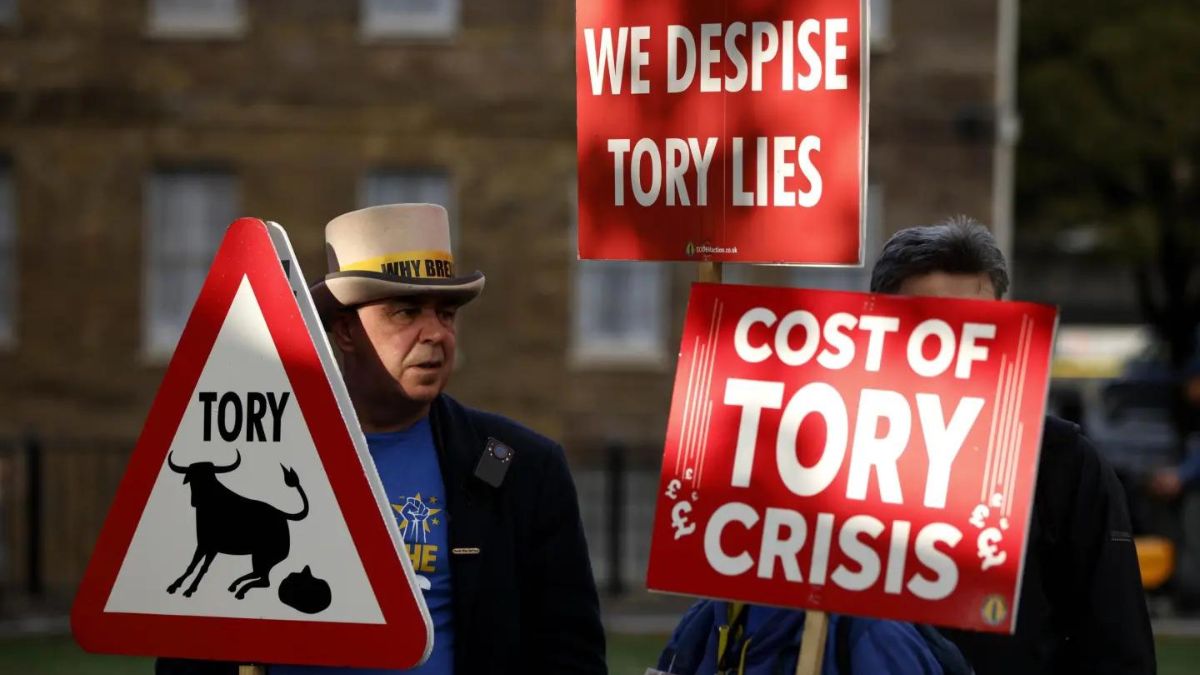The terms “Conservative” and “Tory” have become synonymous over time, with many people using them interchangeably to describe the UK’s Conservative Party. However, the origins and historical significance of these terms are distinct and deeply rooted in British political history.
As the UK goes to vote on July 4, the Rishi Sunak-led Conservative party will face-off with the Labour party led by Keir Starmer. Polls show a Labour majority in the British parliament as the Tories are predicted to face their worst defeat in decades.
The historical origins of “Tory”
The political term “Tory” dates back to the “Exclusion Crisis” from 1679 to 1681 during the reign of Charles II. Parliament was divided into two factions: the Whigs, who sought to exclude Charles’ brother James, the Duke of York, from the throne due to his Roman Catholic faith, and the Tories, who supported James’ right to succeed.
The term “Tory” is derived from the Irish Gaelic word tóraidhe, meaning outlaw or robber, which was initially used as a term of abuse for Irish rebels.
The term “Tory” may also have originated from the Irish word toruidhe or toruighe, meaning “to pursue” or “to hunt.” During the 16th and 17th centuries, it described dispossessed Irish who survived by plundering English settlers. It evolved to denote “outlaw papists” and eventually became a political term during the Exclusion Crisis.
Despite the negative connotations, the Tory faction prevailed, and James became King James II in 1685. David Seawright from Leeds University told BBC, “Simplistically you could say Tories were Cavaliers and Whigs were Roundheads.”
Impact Shorts
More ShortsTories were initially linked with supporting a Catholic heir but later became associated with Anglicanism and strong monarchist and patriotic sympathies.
How did the term “Conservative” come about?
The term “Conservative” began to be widely used in the 1830s under the leadership of Sir Robert Peel. Peel modernised the party by reinterpreting the key elements of the old Tory tradition, advocating for social reform and free trade.
Despite adopting the name “Conservative,” the term “Tory” endured, and both names became interchangeable. The Conservative Party officially embraced the name “Conservative and Unionist Party” in 1912 after allying with the Liberal Unionist Party to oppose Irish Home Rule.
Unlike Labour, the Conservative Party was never officially founded and did not have a written constitution until 1998. This evolutionary development reflects what many historians see as its most essential and enduring feature: adaptability.
Lord Lexden, the party’s official historian, notes, “Patriotism is the first, and most deeply rooted, element of the party’s character.”
“Unionist” & “Tory” in Ireland & America
The term “Unionist” briefly eclipsed both “Tory” and “Conservative” in the early 20th century, reflecting the party’s resistance to Irish Home Rule. However, “Conservative” emerged as the official name later in the century, while “Tory” continued to be used colloquially and in official documents, such as Lord Hailsham’s “Toryism and Tomorrow” lecture of 1957, reported BBC.
Also Read: Who are the key players in the UK general election?
The term “Tory” was also used during the American War of Independence to describe colonists loyal to the British monarchy. In Canada, centre-right Conservatives are still known as Tories, showcasing the term’s enduring legacy in British colonial history.
The modern usage of “Tory”
Today, “Tory” is frequently used by journalists as a shorter alternative to “Conservative,” particularly in headlines. Many Conservative Party members are comfortable being referred to as Tories, and insiders often use both terms neutrally.
Political rivals often use “Tory” in attack lines, such as “Tory cuts” or “Tory austerity.” Former UK Deputy Prime Minister John Prescott, in his 2000 Labour conference speech, referred to “Tory spending cuts” and “Tory froth,” eliciting jeers from the audience.
Also Read: From immigration to cost of living, the key issues for UK voters
David Blunkett, a former Labour minister, stated, “I use ‘Tory’ and ‘Tories’ to describe our opponents because, to me, those terms place them somewhere backward-looking, negative, and reactionary.”
Peter Bone MP mentioned in 2015, “These days it doesn’t matter which you use. People have forgotten the history…Tory is quite handy if you’re tweeting.” Despite the historical connotations, the term “Tory” remains a convenient and widely recognised label for the Conservative Party and its members.
What does the dictionary say?
According to the Oxford English Dictionary:
Tory: Initially referred to dispossessed Irish who became outlaws, later used for those who supported James, Duke of York, during the Exclusion Crisis, and eventually a name for one of the two great political parties in Britain.
Conservative: A supporter or member of the Conservative Party of Great Britain, initially used to describe policies espoused by Sir Robert Peel.
From supporting a Catholic heir to modernising under Sir Robert Peel, the Conservative party has evolved significantly. Despite the derogatory use of “Tory” by political opponents, the term remains a significant and enduring part of the Conservative Party’s identity, both in the UK and across former British colonies.
With inputs from agencies
)